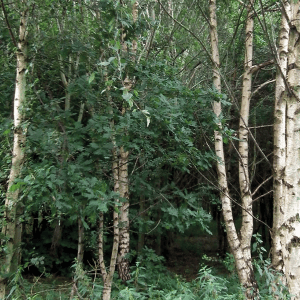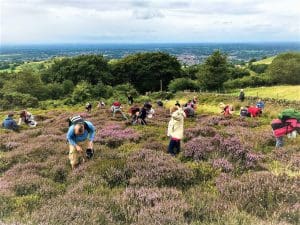Through this piece we’re going to take a look at how Foraging helps to improve our connection to Nature.
Foraging is a powerful tool for connecting people to the woodland environment, fostering a sense of respect and appreciation for the natural world. There are several theories that help to explain the psychological and emotional benefits of foraging, including biophilia and the “nature relatedness” concept.
Often we head out foraging and have this feeling of comfort, most of the time you can’t explain it but we just feel more comfortable and quite a big feeling of gratification which is always lovely, but why do we feel this way?
Biophilia in Foraging
Biophilia is the hypothesis that humans have an innate connection to nature, and that exposure to nature is essential for our well-being. According to this theory, foraging helps to tap into our innate connection to nature by allowing us to engage directly with the plants and animals that make up the woodland ecosystem. By learning about the properties and uses of different plants and fungi, we can develop a deeper understanding and appreciation for the natural world, and this connection can have a profound impact on our mental and emotional well-being.

Find out more about silver birch here
Nature Relatedness
The “nature relatedness” concept is similar to biophilia, and suggests that people who have a strong sense of connection to nature are more likely to experience positive outcomes, such as increased well-being and reduced stress. Foraging can help to foster this sense of connection by providing a hands-on experience with the natural world. By engaging directly with the plants and fungi in the woodland environment, we can develop a deeper understanding of the ecosystem and our place within it. This can help to promote a sense of well-being, reduce stress, and improve our overall health and happiness.

How Community Foraging helps to improve our connection to Nature
Foraging also fosters a sense of community and connection between people. Foraging courses and workshops provide an opportunity for people to come together and learn about the natural world, and this shared experience can help to build strong bonds between individuals. By working together to identify and harvest wild plants and fungi, participants can develop a sense of teamwork and camaraderie, and this can help to promote a sense of belonging and community.

Each year we do community bilberry pick with the Cheshire east rangers..
In Conclusion
In conclusion, foraging is an effective way to foster a connection between people and the woodland environment. By engaging directly with the plants and animals that make up the ecosystem, and by learning about the properties and uses of different species, we can develop a deeper understanding and appreciation for the natural world. The theories of biophilia and nature-relatedness help to explain the psychological and emotional benefits of foraging, and suggest that this type of engagement with the environment can have a profound impact on our well-being and happiness.





